Sudakshina Bhattacharjee's Blog, page 3
January 3, 2014
Freeing Yourself From Egotism
Greetings Dear Blogworms!
Hope the New Year ushers in a fresh breeze of vitality, purpose and spirit!
Indeed, what an original wish….I only just thought of it. 
The last month simply whizzed by for me, with some goodbyes and some hellos, some and some moving on, some dreaming and some poise.
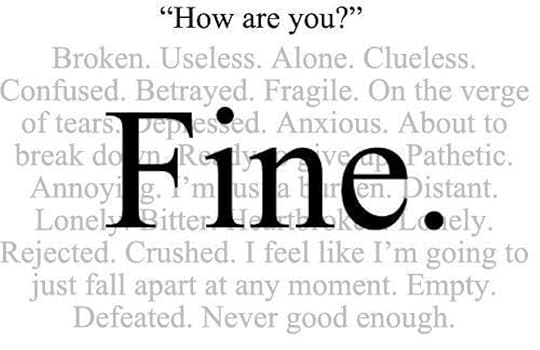
How has it been for you?
Or, more importantly, how would you like this year to be you?
Personally and professionally, I would like to see more and more of us freeing ourselves from lapses of insecurity, petty jealousies and lower ego slumps.
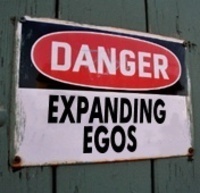
There is nothing like a little insecurity creeping in to make your levels of self esteem and self worth plummet so fast that you did not see it coming!
In such situations, you feel less stronger, more unsure and are prone to negatively comparing yourself with other people or companies.
A lower ego brings about less accountability, i.e. you would blame others more than yourself; be in more denial and mentally generate much clouded judgement.
Examples of Egoistical Statements
The following statements are common examples of egoistical expression…have you come across any or all of these?
“I can still work, even though I have retired. My work defines me.”
“I want this, no I want that, no actually I want this, no, no, I really do want that.”
“I know more than you because I am older than you; so you cannot know more than me.”
“I can do this better/cheaper/faster than you!”
“I know you are capable, but I am not sure if you can do this, but I am giving this task to you because I have nobody else who can do this for me.”
“Why do you always have the good things and I don’t?”
Reading it like this makes it sound funny and you might be even nodding your heads and laughing to yourself right now, because you have either a) experienced this yourself – be it directly or indirectly, or b) you know what I mean even though you have not experienced this yourself in some way.
The thing is, it is so easy to fall into an ego-trap, as the aforementioned examples show, but coming out of such traps can be difficult and even be permanent.
To come out of ego-traps requires mental strength, emotional intelligence and the confidence to pick yourself up, realise what the problem is, own up to it and then sort it out.
Let’s take a look at each of these steps in a little more detail…
Mental Strength
Are you aware of your thoughts, your thought patterns, the directions in which your mind wanders and wonders? Do you take time to think before you carry out certain actions, or to make decisions? How much time do you take? When you’re thinking inside your head, what tone of voice do you hear yourself conversing in? Is the tone patient and kind, or is it sharp, chiding and argumentative?
Emotional Intelligence
Do you voice your emotions quite naturally and spontaneously, or do you keep them locked, stocked and barrelled? Do you release your emotions in controlled, measured ways, or do you remain unruffled about the consequences of your emotional expressions?
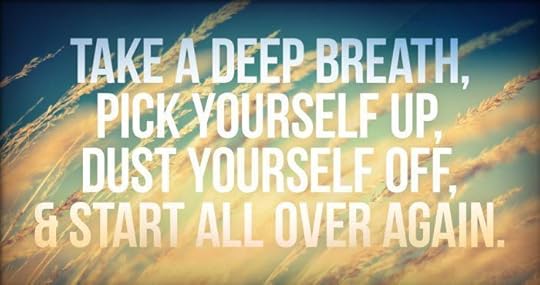
Picking Yourself Up
Depending on the severity of the ego slump that you are experiencing, you need to allow yourself time to go through it before you can be ready to heal and get yourself out from it. Often, we spend far too long denying that we even have an ego slump, or that we have fallen into an ego trap because we are embarrassed by it and consider ourselves ‘being stupid’ for falling into one in the first place. This embarrassment is usually a figment of our own imaginations and the sooner we can clear this away, the sooner we can do away with the ego trap.
Realising the Problem
An ego-trap makes you feel hurt and spiteful; makes you repent for earlier decisions and choices that you had made which lead you to your fears turning true. However, some things are meant to happen and if we become scared of making choices and decisions, we can never even know whether our dreams can come true – or not.
Owning Up to It and Dealing with It.
This is where it takes almost all your inner resources to make yourself admit that you were in the wrong, or have been wronged. That you need to do something to about this; that you wish to learn from the whole experience. Talking to someone about it, whether it is a friend, a parent, a sibling, or a therapist HELPS!
Let 2014 be the year where we embark upon the complex journey of freeing our egos.
All the best! 
November 26, 2013
Moody Women!
Greetings Blogworms!
May this post find you all well and ready to embrace the winter that is setting in rather quickly!
In the meantime, I leave this poem here for you about women and the moods we have.
If you were to ask me whether I have encountered ‘moody women’ this month, I would say no, not quite…..I encounter them all the time, including myself! Haha!
Moody Women
What is it with women-and their moods?
What they feel
What they seal
Can’t be plain old goods?
One minute they’re cheery,
And one minute they’re not.
The next minute they’re teary-
And suddenly they’re hot!
Today they’ll be kind
And pleasant, you shall find.
Tomorrow they’ll be sad-
And whatever you do is bad!
Women are like colours,
With new shades and hues;
Women are like flowers-
Fresh and yours to amuse!
Women get angry –
When you don’t listen;
Women get hungry –
When you don’t miss them!
When women are moody,
They’re feeling weird inside;
So, do not be broody-
Allow them to confide!
 Have a Happy Winter People! Ciao for Now!
Have a Happy Winter People! Ciao for Now! 
October 21, 2013
Only in Britain!
Greetings Dear Blogworms!
I trust all is going well on your end and I sincerely hope that you’re enjoying the new changes that I’m making to the website.
There’s more to come so do, in the words of one of my favourite British comediennes – Miranda Hart – ‘Bear With’! :)
Speaking of British-ness, it has been a while since I have presented to you another one of my lists, hasn’t it?
Well, without further ado, may I present to you Sudakshina’s ‘Only in Britain’ List, which comprises of my own observations on things that happen exclusively, quintessentially in Britain.
Those of you who are British, have a laugh on me, as you may probably be aware of most of these things already. Those of you who live across the world, prepare to be amused, if nothing else. 
So, here goes…
Sudakshina’s Only in Britain List
1. Public notices that state the blaring and glaring obvious!
Only in Britain would you see notices pasted in public transport, lamp posts, random noticeboards and the rest of it that ask us to do things that we already know we are to do.
For example, I recently saw inside a bus a poster that tells us to ‘like asking pushchair and buggy users to make space for the wheelchair users’ and to ‘hold on to the bars’ , so that we don’t fall over in buses!
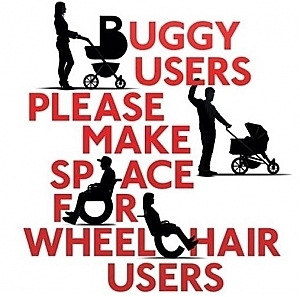
In a noted central London tube station, recorded public announcements are played from time to time warning us that pickpockets are known to ‘work in this area’ and that we must be alert. In Greater London (i.e. the suburbs), where there are bushy trees skirting the sides of pavements, there’ll be signs saying ‘Low Trees’. I mean, no, really? Thanks for telling me. NOT! 
Only in Britain do toilet cubicles have notices which instruct us to flush them after use, I can see why though, because some don’t – despite seeing the notices! Uggh!
Can you think of any other such ludicrous examples?
2. When to Smile at a Random Passerby
Only in Britain does this peculiarly bizarre issue surface. It’s as if randomly smiling at people passing by is either a)frowned upon
or b) thought to be odd.
What’s worse is while you’re thinking about whether to smile back at someone who has just smiled at you, the moment has gone and you’re left feeling weird!
I know, it’s silly, but we all do this here. I blame it on the weather, as we all do to!
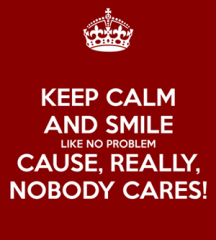
3. Expressing the Bad and Repressing the Good
Only in Britain are things excessively dramatized when they go wrong and things which are going even reasonably well, are repressed to the extent that we rather not know that they actually took place!
For example, I say to someone: “The UK economy is actually growing now, by 0.8%… I guess things are looking up for us.”
This someone immediately retorts with: “Oh no, don’t be silly…things are still ruddy awful!”
Then I say, “But it’s in the news, they can’t be totally wrong now, can they?”
Someone says: “No, no, no! It’s all codswallop!”
Blimey!!

4. Apprehending the Youth (or should I say, ‘Yoof’)
Beware! Hold thy breath! Youths are boarding the bus/train/tube, or a public vicinity of some sort. Only in Britain do we look at our youths with disdain as they can be loud-mouthed, vivacious and ill-mannered.
Conversations automatically turn to something along the lines of ‘what does the future hold for this lot’, tut, tut.
Little do we realize that, once upon a time, we ourselves were not that much different from today’s youth, were we? I mean what’s the point of worrying about the young ‘uns when they’ll manage somehow in the end, like we all do.
Cue rolling eyeballs and a big ‘GOSH!’

5. How SAD are we about the Weather!
It wouldn’t be a truly British list if I didn’t mention the weather. Only in Britain does this unique peculiarity affect us all, at some point in time. A little too much of sunshine, showers, sleet, or snow, gets us moaning and oh how we do we love a good moan about the weather!
I reckon, if there ever was an international ‘Moan -O -Meter’ then it would be Britain getting the highest rating. 

All said and done, what I find funny is that I love all these quirks and I am pretty sure I’m not the only Brit who does! :)

Filed under: Expression, Psychology, Social Cultures, Sudakshina's Opinions Tagged: Britain, British weather, London, Miranda Hart, public facilities, public transport, youth culture







September 1, 2013
Is Tollywood Thinking Too Much?
What is it with us Bengalis- why do we have an inexplicable need to intellectualize almost every single thing in our lives- whether it’s mundane or momentous?
Why are we so confused when it comes to adopting cultural values whether they are inherent or foreign to our society?
Mind you, is this a class-based issue: do those hovering around the poverty line face this conundrum too? Or, is it something that comes with an English-medium based education and an affluent upbringing that is more exposed to Western values?
These are some of the intriguing issues which Tollywood’s (i.e. what contemporary Bengali Cinema is known as, based on their studio location, in a south Kolkata town, called Tollygunge) big and small production houses are exploring through their movies in the past few years.
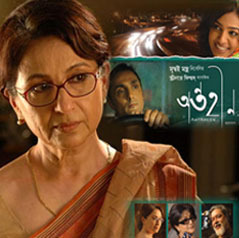
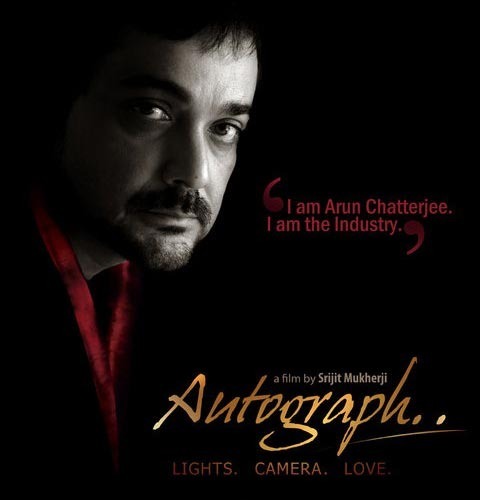 From the poetic stance while chatting on Google Talk, as seen by the characters essayed by Rahul Bose and Radhika Apte in the film Antarheen (2007); to the supercilious floundering of the live-in relationship explored through the protagonists in Autograph (2010); to the so-called ‘doom’ of having pre-marital sex and childbirth out of wedlock in Iti Mrinalini (2011); to the vague, confused, bewildered effusions and expectations of relationships fostered in today’s modern society, where the dichotomy of Old-Eastern/New-Western cultural values perturb thirty-something men and women as seen in Bedroom (2012).
From the poetic stance while chatting on Google Talk, as seen by the characters essayed by Rahul Bose and Radhika Apte in the film Antarheen (2007); to the supercilious floundering of the live-in relationship explored through the protagonists in Autograph (2010); to the so-called ‘doom’ of having pre-marital sex and childbirth out of wedlock in Iti Mrinalini (2011); to the vague, confused, bewildered effusions and expectations of relationships fostered in today’s modern society, where the dichotomy of Old-Eastern/New-Western cultural values perturb thirty-something men and women as seen in Bedroom (2012).
What are these films trying to really convey to us?
If film and television are indeed mirrors of society, then what exactly are the aforementioned films trying to reflect back at us?
If it’s a miasma of feelings which irk and blur your consciousness when you have seen these films, doesn’t it then prod you to think of what the overall purpose is behind such sociological and cultural themes that are currently encompassing contemporary Bengali cinema?
We all know how globalization has brought in its wake a globalized economy, which has physically brought all seven continents closer than ever before. So, it must be impacting on societies one and all with their different complexes and myriad complications.
While the West has taken to (what was one exclusively Eastern) metaphysical and spiritual inclinations quite dearly, they have integrated these into their overall culture without affecting their inherent consumerist liberalism.

For example, they don’t hide issues like pre-marital sex, smoking and drinking from their elders and betters (the opposite of which is seen in Bedroom, where the characters essayed by Parno and Paoli Dam sneak a few swigs and puffs in their dressing rooms- before their weddings!); but then the more sensible of them do not flaunt their freedom about like some sort of banner either. They could easily go for a yoga class and then nip to the pub afterwards.
So, why is it that Bengali society has so much trouble in tackling Western and Eastern values altogether, simultaneously? For instance, why are live-in relationships garbed and disguised in front of parents and families, of the upper classes? If acceptance is the problem then shouldn’t both sides come to terms with how to deal with their desires and intents?
If you take a good look into the mise-en-scene of the aforementioned films, you will find the absence of the Hindu ‘Thakurer Ghor’ or prayer room in the sets. Is the message coming to us suggesting that live-in couples don’t believe in the religious practices they were likely to have been brought up to believe in as children? Is this even true or realist at the least?
Looking at it this way makes it seem that one cultural value is adopted in lieu of another. Does this mean that Bengali society is intolerant of multicultural values, in general, or is it just the so-called ‘heinous’ ones?
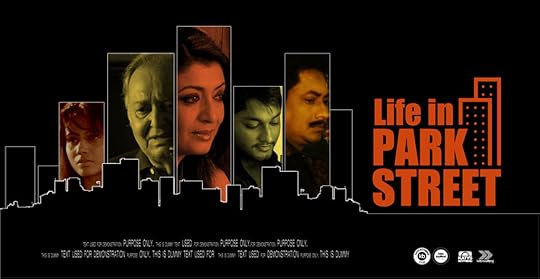
Life in Park Street (2012), however, seems to be bolder in that it shows live-in relationships, mutually-separated-yet-not-divorced couples, closeted gay sex, extra-marital affairs and the frustrations of taking a fling into ‘relationship’ territory. Albeit this film makes out Park Street- one of Kolkata’s primary ‘happenin’ hotspots- to be some sort of ‘Sin City’ and could probably be voted for the film having the most atrocious dialogue of the year-but at least the message is conveyed in-your-face.
Confusingly, the message behind the story in Abosheshe (2012) has left me wondering and wondering about what it is exactly. Roopa Ganguly’s character is seen to refuse to leave her hometown, Kolkata, to start a life with her husband and little son in America. In other words, her love for Kolkata is stronger and more profound than her love for her family. Do such people really exist? Probably in the West, where anything is possible; but what about in India, particularly in Bengal, which is overwhelmingly marred by its baffling, often stifling values?

Sometimes, cultural products of film and television can work as the light at the end of the tunnel. Maybe Tollywood could make some movies that offer possible solutions, or scope for insightful debate, to these perplexing issues, instead of merely indulging in the pathos of a society that’s struggling to integrate with a globalized culture.
Filed under: Psychology, Social Cultures, Sudakshina's Opinions Tagged: bengali cinema, contemporary cinema, movies, south asian cinema, Tollygunge, Tollywood, world cinema

July 31, 2013
Content Is Not King!!
Hello, Dear Blogworms,
Trust your month has gone well, mine has, thankyouverymuch!
I’ve been doing a lot of writing this past month and if there is one thing I would like to say is that the at the heart of any business is its products and services.
Communication is important, content is important too. But by no means is content ‘king’!
It’s all I hear these days, you know by marketing know-it-alls, social media busybodies, advertising whizzes, etcetera, etcetera…They might as well be wearing placards and ring bells, chanting “Content is King!” “Content is King!”…the way they’re going on!

I just look at them (maybe blankly, come to think of it) and wonder – “Do they know what they mean?”
Also, since when did a non-living object, such as content, become personified? And while we’re on personification, who decided that content is “king” and not “queen”?
I’m not the one to buy this (rather warped) logic that if a man produces content, it’s “king” and if a woman produces it, it’s “queen”!
Is it just me or does this really make sense to you? Okay, let’s try to work it out:-
Firstly, content is not gender-specific, could we just make that clear from the start please (cue rolling eyeballs, if you must). No, content is just that…content. Text, images, videos, pages, links and graphics – all these things can be created by anyone so inclined. Let’s remind ourselves that all these forms of content are material manifestations of our ideas, thoughts, musings, perceptions and ruminations. Capiche? Good.
Secondly, at the end of the day, the core of any business is its product/(s) and service/(s). You can call me traditional, or conventional (and since when does such labels induce raised eyebrows, I don’t know), but if a product/service has strong USPs (i.e. Unique Selling Points to me and you) and features that are credible as they are practicable, this should be the driving force, the crux on which any business thrives and succeeds on. Therefore, any content generated – be it websites, signboards, etc, or be it in the form of marketing collateral (i.e. brochures, leaflets, pamphlets, pens, pads, carrier bags, etc.) these all orbit around the products and services of a business.
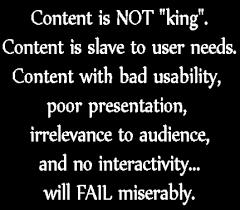
Thirdly, as far as consumers and customers are concerned – products and services are classified into two broad categories: a) what can I afford (therefore need)? and b) what can I not afford (therefore want)? Similarly, investors also have two broad categories when it comes to deciding whether or not to put their money on a product/service/business: a) Will this work? Does the public need this? b) Will this not work? Does the public want this?
Yes it can be as simple as that and I’ll tell you something else – the mass media do enough commercial promoting than we could keep up with and traditional forms of advertising still work – otherwise they wouldn’t cost the roof!
Mind you, websites have caught on quite a bit…and so have the ‘Likes’ (pun intended) of Facebook, Twitter, YouTube, etc.
But does this mean that the content we create takes centre-stage when promoting something? Surely, as common sense would dictate, the promotional content created is to focus on the product/service/business – and not the other way round? Because that would mean we would be buying into the content and not the product/service/business per se?
Well, not always anyway….depending on how intellectually engaging and psychologically stimulating the content is, right?
If I sound naïve here, I do not apologise, because the way I see it, consumers and investors would want to know what the deal is with a product and service before they loosen their purse strings. They would prefer the straightforward, up front approach, because nobody has the time for waffle.
While, I’m not advocating forceful, hard-selling here, I am going to champion the cause of cutting the waffle down to the bare minimum and getting – logically – straight to the point.
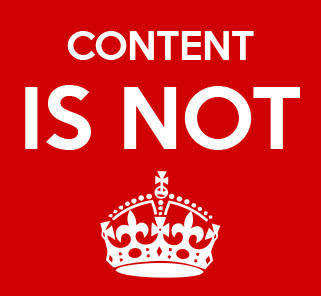
I therefore argue that content is NOT king!
Rant Over.
Filed under: Expression, Psychology, Social Cultures, Sudakshina's Opinions Tagged: advertising, businesses, communications, content, gender, king, marketing, products, public relations, queen, services, writing

June 30, 2013
Pushchairs!!
Greetings, Dear Blogworms!
Trust all is well on your end and hope you haven’t missed me too much. 
Here’s a poem for you all, which I hope you would find funny and if anyone does find it rude or offensive, I will consider my job done! 
It’s called ‘Pushchairs!!’ and it goes like this:-
Pushchairs!!
Hurry! Hurry! Hurry!
Must dash! Gotta go-
I need to catch that bus and scurry
Damn, that pushchair is slow!
Swish! Swish! Swish!
I’m shopping at full speed!
Oops! Down goes that dish-
A pushchair had me kneed!

Hum-dee-dum-dum!
My bus meanders through the scrum.
Passengers’ hustle and bustle-no space-
Two pushchairs battle all over the place!
Faster! Faster! Faster!
That’s how we live here.
No time for manners, no time for fear!
Pushchairs scowl and people howl
Over the chaos-our minds are foul!
Listen! Listen! Listen!
No! No! No!
No time to cooperate – it’s time to go!
Hurry we must-nobody to trust-
So much pressure people do thrust!
Wait! Wait! Wait!
What if we slow down?
That won’t do, as people will frown!
Breathe in, breathe out
There’s no need to pout,
For if we make time,
You won’t need to shout!
Do I hear commuters chuckling? 
Filed under: Poems By Sudakshina Tagged: angry mothers, angry mums, commuters, commuting, prams, pushchairs

June 2, 2013
Write It Right!
Greetings Dear Blogworms! 
Those of you who have a penchant for smartphones and converging gadgets would be pleased to know that I have invested in a Samsung Galaxy Tab II – a delightful little gem that is sometimes too fast for me, but so wacky, so light and portable, so hot and cool, that I cannot and will not moan about it – till it makes me! 
Yes, because of this innovation, I am now going to present to you my second video blog post in which I provide my, what-I-call Top 5 Tips in Business Writing! These tips not only apply for English but also when you use a vernacular language too. Yes, spending most of my life flitting between England and India is paying off with the number of languages and dialects I have come to be familiar with. Not that I’m gloating or anything…:)
Anyways, here you are. I hope you like it and do let me know what you think, either via my social media channels, or a comment on this page. You know I won’t bite! 
If you like what you saw here, there’s much more helpful guidance in Business Writing in the book which myself and my dear co-author, Fiona Talbot have written for you: Improve Your Global Business English: The Essential Toolkit for Writing and Communicating across Borders. (Kogan Page, 2012).
Happy Reading and Writing! :)
Filed under: Expression, Sudakshina's Opinions Tagged: Bhattacharjee, business, business writing, clear, culture, emails, Facebook, Global Business English, improve, LinkedIn, samsung galaxy tab 2, Social Networking Media, Sudakshina, top 5 tips, Twitter, videoblog, wordpress, writing

April 28, 2013
Aww…Derek!
Hi Dear Blogworms! 
Hope all is well on your end? But then how am I supposed to know, when you don’t tell me? A comment here or there won’t go astray, ya know. 
I’m a stickler for comedy, in all it’s forms-stand-up, sitcom, filmic, theatre, novels and whathaveyou. I can’t get enough of how these talented wits can eke out what we do wrong and what we think is ‘right’ but ends up looking downright silly or plain stupid.
Now, I’ve watched most of the work by one Ricky Gervais, who has contributed greatly to British popular culture, in recent years. Be it, TV films, podcasts, books and stand-up tours, this bloke has done it all…and I’m sure has still a lot to give us. 
You can get more info about him here: http://www.rickygervais.com/
I believe it’s his inherent philosophical perspective, which he gets his characters to reflect, in such a seemingly simple way, that has struck chords in the hearts of his audiences globally.
I cannot help but notice the recurrent, or should I say, central theme on which his oeuvre is based on- i.e. dysfunctional elements in so-called ‘normal’ folk!
Gervais uses the camera to zoom into the weirdness that makes up our ordinary lives, things which we usually cringe about and feel embarrassed about. He also makes the camera pan (sometimes, suddenly, as if to jolt us up) and get us to see something which we otherwise wouldn’t have noticed or acknowledged-and then laugh about it!
It’s as if he gets the camera to do much of the talking, as if the camera is telling us “Oi, look you lot…this is what we do! Ain’t it funny!” Gervais likes to put silence to good use too, his actors emote and express much more and only use dialogue when Gervais wants them to make a point in bold!
That’s probably why there are some who don’t quite get his brand of comedy. Indeed, one would need to keep his/her brain switched on to watch and take in the sort of humour he portrays, to mull over afterwards.
It’s as if Gervais wants you to debate about (whether with others, or to yourself) what he has to say; to really question yourself on what really matters- and what doesn’t-in the lives we are leading/living today.
With his previous work, he has taken a more flippant and haha-that’s-soooo-funny! approach, but with his more recent work-a television programme, called Derek- is subtle, very sensitive and sweet in nature. Something that has astonished me and even made me shed some tears of appreciation.
Derek and Hannah are beautiful characters because they have something which stand them out from the rest- they have pure souls carefully brought out through Gervais’s inimitable narrative, stoic stance and rational approach.
“For me, insanity is super sanity.
The normal is psychotic.
Normal means lack of imagination, lack of creativity.”
– Jean Dubuffet
I honestly don’t see why most of the British press created a vendetta against Derek, which is just another TV programme, only it is full of thought-provoking messages.
In a recent press meet, Gervais said:- “everything I’ve done has polarised people, but I wouldn’t have it any other way…I hope that watching Derek might help viewers reassess their attitude to older people.”
I’m appalled to deduce that they have chosen to instigate people’s viewpoints (and therefore jazzing up their readership figures) using Gervais’s brand/auteurship.
Anyways, no offence to anyone concerned here-it’s just fair comment, after all. 
Here are some quotes from the main cast to help you see why I love this programme so much:-
Quotes from Derek:-
“I love working here, but I’m always sad.”
“Is he handicapped?’ asks the council inspector
- “Yeah. He’s too kind for his own good,” says Hannah. 
“If I am ’tistic [autistic], will I die?” asks Derek
- “No,” he’s told.
” So will that change me in any way? Would I be the same person?” he asks.
-”Yes,” reassures Hannah.
“Don’t worry about it then” says Derek to the council inspector.
“I loves it here…all my favouritest people are here.”
“Egg with sideburns”-description of Dougie’s hairstyle.
“He [Derek] is a better person than the rest of us.”
Quotes from Hannah:-

“She has five bedrooms-but no space for her mother.”
“I’ve never understood budgets when it comes to things like this. It costs what it costs. If it costs more than some person in a suit thought it would, it doesn’t mean we’ve overspent or anything, it means your stupid guess was wrong”.
Quotes from Dougie:-

“From the moment you’re born…from the moment your head pops out, someone gives you a slap! Y’know, to make you cry.”
“And that’s it, innit. For the next 70 or 80 years, that’s what life is. Someone giving you a slapping and a load of crying.”
“What I find fascinating is how it’s [his hairstyle] never come to fashion, when you think of the things that have come and gone.”
“You’re like a f**king magpie coming in here getting anything that’s shiny. You didn’t give a s**t about your mam; it’s been Hannah who’s been looking after here all this time!”
“Oh, you’ve been busy? Well, it doesn’t matter anymore does it? Your mam’s dead!”
Do ya see what I mean?!
Gervais gives us heaps to think about here-whether we like it or not!
Filed under: Expression, Psychology, Social Cultures, Sudakshina's Opinions Tagged: Comedy, derek, dougie, dysfunctional, hannah, karl pilkington, kerry godliman, normal, popular culture, press reviews, ricky gervais, television

Oh Derek!
Hi Dear Blogworms! 
Hope all is well on your end? But then how am I supposed to know, when you don’t tell me? A comment here or there won’t go astray, ya know. 
I’m a stickler for comedy, in all it’s forms-stand-up, sitcom, filmic, theatre, novels and whathaveyou. I can’t get enough of how these talented wits can eke out what we do wrong and what we think is ‘right’ but ends up looking downright silly or plain stupid.
Now, I’ve watched most of the work by one Ricky Gervais, who has contributed greatly to British popular culture, in recent years. Be it, TV films, podcasts, books and stand-up tours, this bloke has done it all…and I’m sure has still a lot to give us. 
You can get more info about him here: http://www.rickygervais.com/
I believe it’s his inherent philosophical perspective, which he gets his characters to reflect, in such a seemingly simple way, that has struck chords in the hearts of his audiences globally.
I cannot help but notice the recurrent, or should I say, central theme on which his oeuvre is based on- i.e. dysfunctional elements in so-called ‘normal’ folk!
Gervais uses the camera to zoom into the weirdness that makes up our ordinary lives, things which we usually cringe about and feel embarrassed about. He also makes the camera pan (sometimes, suddenly, as if to jolt us up) and get us to see something which we otherwise wouldn’t have noticed or acknowledged-and then laugh about it!
It’s as if he gets the camera to do much of the talking, as if the camera is telling us “Oi, look you lot…this is what we do! Ain’t it funny!” Gervais likes to put silence to good use too, his actors emote and express much more and only use dialogue when Gervais wants them to make a point in bold!
That’s probably why there are some who don’t quite get his brand of comedy. Indeed, one would need to keep his/her brain switched on to watch and take in the sort of humour he portrays, to mull over afterwards.
It’s as if Gervais wants you to debate about (whether with others, or to yourself) what he has to say; to really question yourself on what really matters- and what doesn’t-in the lives we are leading/living today.
With his previous work, he has taken a more flippant and haha-that’s-soooo-funny! approach, but with his more recent work-a television programme, called Derek- is subtle, very sensitive and sweet in nature. Something that has astonished me and even made me shed some tears of appreciation.
Derek and Hannah are beautiful characters because they have something which stand them out from the rest- they have pure souls carefully brought out through Gervais’s inimitable narrative, stoic stance and rational approach.
“For me, insanity is super sanity.
The normal is psychotic.
Normal means lack of imagination, lack of creativity.”
– Jean Dubuffet
I honestly don’t see why most of the British press created a vendetta against Derek, which is just another TV programme, only it is full of thought-provoking messages.
In a recent press meet, Gervais said:- “everything I’ve done has polarised people, but I wouldn’t have it any other way…I hope that watching Derek might help viewers reassess their attitude to older people.”
I’m appalled to deduce that they have chosen to instigate people’s viewpoints (and therefore jazzing up their readership figures) using Gervais’s brand/auteurship.
Anyways, no offence to anyone concerned here-it’s just fair comment, after all. 
Here are some quotes from the main cast to help you see why I love this programme so much:-
Quotes from Derek:-
“I love working here, but I’m always sad.”
“Is he handicapped?’ asks the council inspector
- “Yeah. He’s too kind for his own good,” says Hannah. 
“If I am ’tistic [autistic], will I die?” asks Derek
- “No,” he’s told.
” So will that change me in any way? Would I be the same person?” he asks.
-”Yes,” reassures Hannah.
“Don’t worry about it then” says Derek to the council inspector.
“I loves it here…all my favouritest people are here.”
“Egg with sideburns”-description of Dougie’s hairstyle.
“He [Derek] is a better person than the rest of us.”
Quotes from Hannah:-

“She has five bedrooms-but no space for her mother.”
“I’ve never understood budgets when it comes to things like this. It costs what it costs. If it costs more than some person in a suit thought it would, it doesn’t mean we’ve overspent or anything, it means your stupid guess was wrong”.
Quotes from Dougie:-

“From the moment you’re born…from the moment your head pops out, someone gives you a slap! Y’know, to make you cry.”
“And that’s it, innit. For the next 70 or 80 years, that’s what life is. Someone giving you a slapping and a load of crying.”
“What I find fascinating is how it’s [his hairstyle] never come to fashion, when you think of the things that have come and gone.”
“You’re like a f**king magpie coming in here getting anything that’s shiny. You didn’t give a s**t about your mam; it’s been Hannah who’s been looking after here all this time!”
“Oh, you’ve been busy? Well, it doesn’t matter anymore does it? Your mam’s dead!”
Do ya see what I mean?!
Gervais gives us heaps to think about here-whether we like it or not!
Filed under: Expression, Psychology, Social Cultures, Sudakshina's Opinions Tagged: Comedy, derek, dougie, dysfunctional, hannah, karl pilkington, kerry godliman, normal, popular culture, press reviews, ricky gervais, television

March 24, 2013
What’s ‘Normal’?!
Hi Blogworms,
How goes it with you all? Good, I hope. 
Thank to those of you who saw my video blog post in the previous month. Your feedback has been encouraging and I’ll make more of them in the near future.
Meanwhile, let’s move on to topics anew. I’m back in London now and hope to be here for a while. So, I went shopping (no delays there, haha!) and came across a quirky little book, which calls itself ‘a journal’, and is called My Dysfunctions. Oh wait, we’re online aren’t we, so here’s a photo of what it looks like:-
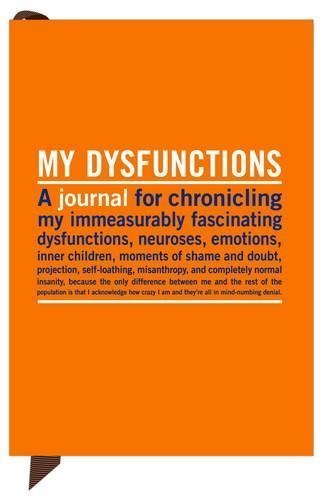
Funny, isn’t it? 
The idea behind this mini journal, is for the user to jot down what he/she finds dysfunctional on a given day and there are relevant quotes from big wigs to prod one’s thoughts on this matter.
So, I started jotting today and I’d like to share my ruminations with you. I can’t promise whether these would be dysfunctional, but then I guess it’s a ‘to each his/her own’ thing!
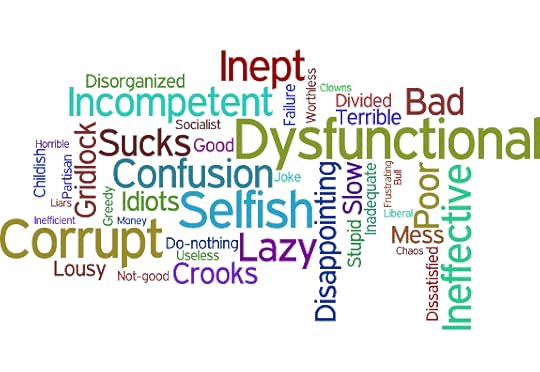 Are we normally insane or insanely normal?
Are we normally insane or insanely normal?
How is being normal defined in today’s day and age?
According to the theme of this mini-journal, being normal = being dysfunctional.
The more I think about it, the more I find myself being able to spot the quirks and kookiness in whoever I encounter- me included, of course. [I happen to be listening to some Bhangra remixes by a well-known British Asian music production label, as I write this post-is that being dysfunctional?]
Indeed, is there an antidote for being dysfunctional? Should there even be one? For if being normal is now synonymous with being dysfunctional then why do we have this inexplicable urge to remedy it?!
I think that instead of there being this pseudo-existent yardstick that judges how ‘normal’ one is, there should be something that helps us gauge how dysfunctional we are.

Yes, this would definitely put things into perspective. We could call it the ‘Dysfunction-O-Meter’, or the ‘Scale of Dysfunctionality’, something weighty and is of import, so that we all take it seriously. :)
No, seriously. What are you smirking at?!
Filed under: Sudakshina's Opinions




